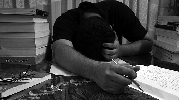I often hear from folks who are willing (and often do) try anything to stop their hair loss. And because experiencing hair loss can cause panic that makes you fear that you could go bald (or at least need drastic measures or supplemental hair) any day, people will often try many different treatments all at once, hoping that one of the will work, or will at least improve the situation.
I often hear comments like: "I've tried everything to stop my hair loss but nothing has worked. I've tried all of the shampoos and topicals. I've used anti androgens. But nothing helps and I'm not sure what to do now. I'm just about ready to give up."
I greatly sympathize because I have been in that exact place and I know first hand that it's not a great place to be. Sometimes, you have to take a step back and to try to look at the problem from an objective, rather than an emotional, place. I realize that this is easier said than done. But sometimes emotions cause you to throw all sorts of treatments or potential solutions at the problem so that you really can no longer tell what is helping or hurting you.
Are You Using The Right Treatment Meant To Address The Exact Cause Of Your Hair Loss?:If your hair loss is the result of yeast overgrowth, then it doesn't make sense to treat for AGA by using anti androgens. Or, if your shedding is driven by an autoimmune disorder, then it's likely that you're going to have better results if you treat the underlying medical condition rather than throwing topical treatments on your scalp without ever addressing the "trigger."
Many people have a hard time determining why they are loosing their hair, so they will just throw a bunch of treatments onto the problem and hope that something sticks. The problem is often that they try too many things at once so that nothing is really effective. Or, they don't give a treatment a long enough trial period to really objectively evaluate it's effectiveness. By the time that they might have seen real improvement or noticeable changes, they are already on the the next treatment.
Do You Know Your Trigger? Are You Treating It?:If you've been loosing hair for a while (rather than for just a few days or weeks) then it's likely that there is some trigger or stimulus that is causing this. Even long term conditions like CTE (chronic telogen effluvium) have a trigger that is setting the hair loss into motion. The most vital step in stopping your hair loss is often finding and then successfully addressing your trigger.
But so few people are actually able to accomplish this. As I alluded to, most folks will try the "one size fits all" treatments and just hope for the best. It's like treating the symptoms of your hair loss rather than addressing the root cause. Sure, you can try treatments that help with your regrowth. But if your hair just continues to shed out over and over for a long period of time, then it can be very hard to really gain any ground.
If You Can't Figure Out Why You're Loosing Hair, Are You At Least Addressing Inflammation And Regrowth?:Sometimes, you're at the point where you're currently unable to identify your trigger. This doesn't have to mean that you do nothing. You can always take preventative measures. Most types of hair loss cause inflammation of the scalp which can lead to more hair loss. So, it can be a decent idea to address and try to combat this inflammation.
Additionally, it makes sense to do everything you can to ensure that you're regrowing quality hair rapidly. Some types of hair loss come with militarization. This means that the hair coming back in is more thin and fine which means that it can't cover your scalp as well. Over time, this can lead to thinning and balding. You want to do your best to combat this. And, you want to make sure to help your scalp achieve vigorous regrowth. Think about it this way. Even if you can't control your hair loss right now, you want to at least make sure to replace what you've lost so that you're really not experiencing any permanent losses.
Above All, Don't Give Up:I often tell people that they've only lost the hair loss game when they give up altogether. I know it's very easy to become discouraged and frustrated. But when you give up, you run the real risk that something which may have worked was right around the corner. I believe that in order to be successful, you have to take a very methodical approach to this. If you give up, you're often not able to do that. There's nothing wrong with taking a break and regrouping when you get discouraged. But giving up is a sure way to ensure you won't get the results that you were hoping for because you didn't give yourself the chance to do so.
How do I know all of this? Because I lived it. In my quest to end my hair loss, I looked at my triggers, my iron, my thyroid, my adrenals, my hormones, and my scalp. It was a long, hard, frustrating journey which all but wrecked my self esteem. But, I never gave up and I finally found something that helped quite a bit. You can read a very personal story at / .



